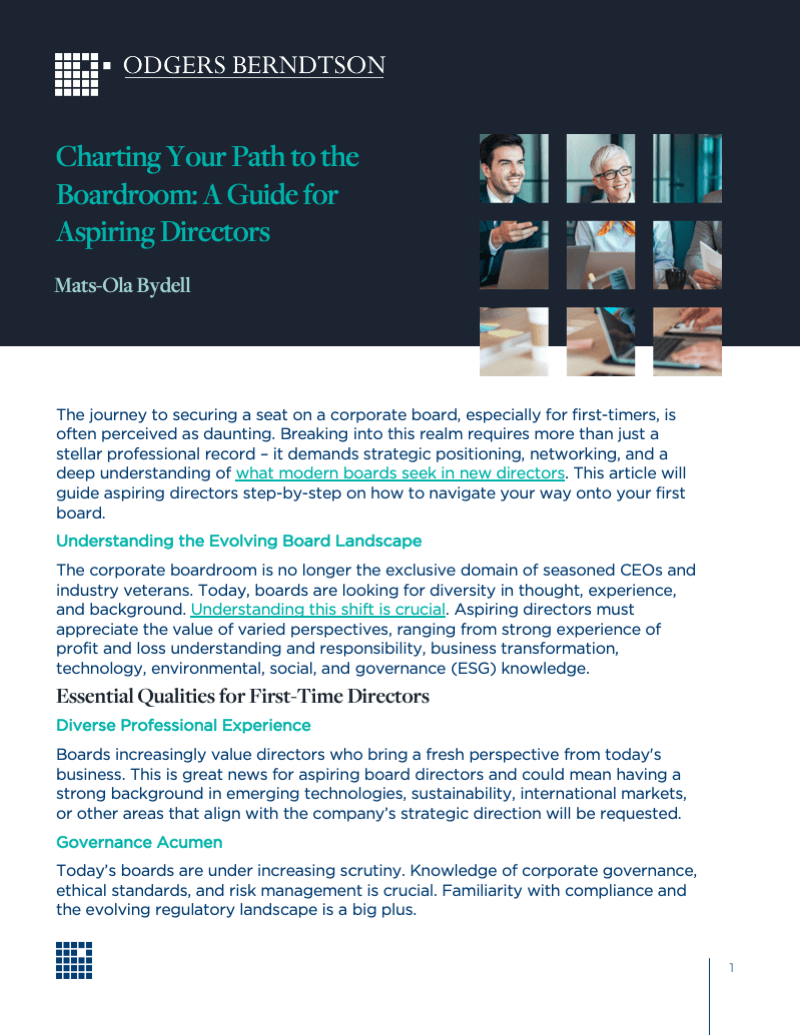The journey to securing a seat on a corporate board, especially for first-timers, is often perceived as daunting. Breaking into this realm requires more than just a stellar professional record – it demands strategic positioning, networking, and a deep understanding of what modern boards seek in new directors. This article will guide aspiring directors step-by-step on how to navigate your way onto your first board.
Understanding the Evolving Board Landscape
The corporate boardroom is no longer the exclusive domain of seasoned CEOs and industry veterans. Today, boards are looking for diversity in thought, experience, and background. Understanding this shift is crucial. Aspiring directors must appreciate the value of varied perspectives, ranging from strong experience of profit and loss understanding and responsibility, business transformation, technology, environmental, social, and governance (ESG) knowledge.
Essential Qualities for First-Time Directors
Diverse Professional Experience
Boards increasingly value directors who bring a fresh perspective from today's business. This is great news for aspiring board directors and could mean having a strong background in emerging technologies, sustainability, international markets, or other areas that align with the company’s strategic direction will be requested.
Governance Acumen
Today’s boards are under increasing scrutiny. Knowledge of corporate governance, ethical standards, and risk management is crucial. Familiarity with compliance and the evolving regulatory landscape is a big plus.
Strategic Vision and Critical Thinking
Boards appreciate members who can contribute to long-term strategic planning and offer critical insights on various business challenges.
Strong Communication Skills
The ability to articulate ideas clearly and engage in constructive debate is vital. A director must be a listener and a persuasive speaker.
Strategies to Get on Your First Board
If this is your first time vying for a board seat, start here:
- Build and Leverage Your Network: Networking is key. Engage with industry groups, attend relevant events, and connect with current board members. Your professional network can be a powerful tool in identifying board opportunities.
- Showcase Your Expertise: Develop a personal brand that highlights your unique skills and experiences. This could involve speaking at industry events, writing thought leadership articles, or participating in panel discussions.
- Work with Executive Search Firms: Many boards hire executive search firms to find suitable candidates. Building a relationship with these firms can increase your chances of being considered for board positions. This is something Odgers Berndtson helps both corporate clients and individuals seeking board positions. We hope you’ll reach out to one of our partners if you need help or guidance.
- Focus on Continuous Learning: Stay informed about the latest trends and challenges in the industries you are interested in. Consider enrolling in courses or workshops that enhance your understanding of board responsibilities and governance.
- Seek Mentorship: Connect with experienced board members who can offer guidance, mentorship, and potentially recommend you for board positions.
Preparing for Board Interviews
Once you’ve landed an interview for a board position, thorough preparation is essential. Understand the company’s business model, challenges, and industry dynamics. Be prepared to discuss how your unique experience and skills align with the company’s needs and how you can contribute to its strategic goals in a new and value-add way.
The Importance of Patience and Persistence
Most current board directors will tell you that this is the most important advice in this article. Securing a board position often takes time and persistence. It often requires waiting for the opportunity that fits your personal experience, skills, and goals. Do not be discouraged by initial setbacks. Continue to build your profile, expand your network, and seek opportunities to demonstrate your board readiness.
Securing your first board position is a process of strategic positioning, networking, and continuous learning. It's about showcasing your unique value proposition to a board and demonstrating how your experiences and perspectives can contribute to a company’s success. With the right approach and persistence, the path to the boardroom is within reach for aspiring directors.




